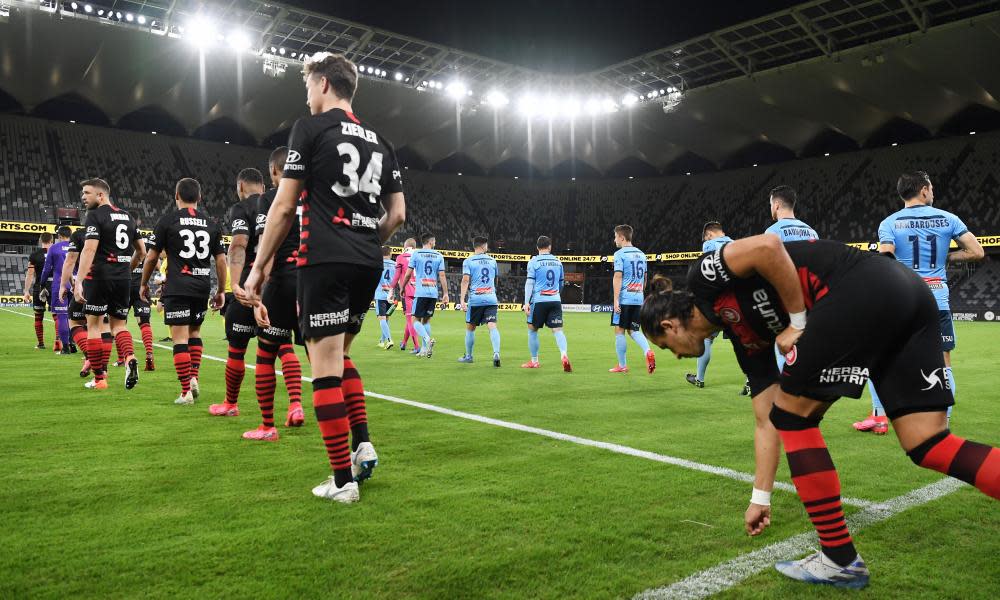A-League stands firm against Fox Sports with restart on hold

A plan to conclude the A-League season has been announced by Football Federation Australia, A-League clubs and the players’ union. If it materialises, 32 matches will take place in 35 days from mid-July to mid-August. “We are committed to delivering the completion of the Hyundai A-League 2019-20 season,” said FFA CEO James Johnson.
But there’s a catch. Broadcast partner Fox Sports has not yet agreed to the terms of the resumption, and until that matter is resolved everything is on hold.
Related: No football, no A-League grand final, no hype... but also no despair | Jonathan Howcroft
The suspension of sporting activity in Australia amidst the Covid-19 pandemic has brought into play the force majeure provision in the broadcast agreement. This means that while matches are not being played Fox Sports can terminate the remaining three years of the deal without penalty. Even if they don’t want to walk away entirely, the option to do so provides enormous leverage in any attempt to renegotiate the terms of the contract.
Consequently, FFA are incentivised to return to action as swiftly as possible; Fox Sports are not. By announcing a formal plan to resume the A-League, FFA are telling fans and stakeholders they are ready, and in so doing inviting Fox Sports to communicate why a restart should not go ahead (for example for reasons of scheduling or production) alongside the return of the NRL and AFL.
Moreover, in the announcement, head of the A-League Greg O’Rourke indicated a return to competition would not just see the A-League return to business as usual, but feature enhanced commercial opportunities to make the existing deal even sweeter for a broadcaster. “We will be including new and innovative elements to the matchday broadcast experience,” O’Rourke said, adding: “Our focus is also on optimising the broadcast flow and therefore providing football content seven days a week. We believe that there are great opportunities for our broadcast partner and therefore the fans.”
In other words, a broadcast partner would need a compelling reason to turn down such an offer. But bringing discussions into the public domain, however coded, is not without risk. “We never comment on commercial negotiations or speculation about broadcast rights,” asserted head of Fox Sports Peter Campbell recently when Rugby Australia was in a not dissimilar predicament. That episode did not end well for rugby, bringing to mind the old adage of not picking fights with anyone who buys ink by the barrel.
So, what is on the table? SBS reported on Wednesday that Fox Sports want to reduce the value of their remaining $57m per year obligations by up to 50%. Nine newspapers later indicated that figure could be as high as 70%. Further reports have since circulated that the game has been asked to accept as little as $10m per year. They are not insignificant sums, even in an exceptional environment whereby some level of downsizing by all parties must have been expected.
Fox Sports has signalled its dissatisfaction with professional football for some time as viewing figures and public interest have failed to match the expectations set following the extension of their relationship with the A-League in late 2016. This has been accompanied by commercial challenges for the broadcaster, exacerbated by the pandemic.
How much do they now value the content for their own platforms? How much do they not wish to see the product they have invested in for 15 years go elsewhere, and possibly flourish? How much reputational damage are they prepared to sustain if they are perceived to be opportunistically strong-arming a long-term partner during a crisis?
As the standoff has progressed, the Australian football community has found itself in the not always common position of finding players, clubs and administrators aligned strategically under FFA leadership. Discussions have been kept largely in-house until this week when a degree of urgency was added owing to a sizeable proportion of A-League players coming out of contract on 1 June.
After intense discussions on Tuesday and Wednesday fears of a pay war were averted and the unified bloc prevailed. “Today we took an important step with the clubs and FFA toward ensuring the health of the game’s short and long-term future,” said Professional Footballers Australia CEO John Didulica.
Australian football is once again on the verge of a boardroom fight that has at stake the professional game as we know it. Only this time, for now at least, there is unity within the tent. “FFA, the clubs and the PFA have all worked collaboratively throughout this process,” said Western Sydney Wanderers chairman Paul Lederer. “This is about teamwork for the good of the game.”
It remains to be seen if this teamwork is sufficient to restarting the A-League campaign and returning it to television sets any time soon.

 Yahoo News
Yahoo News 
